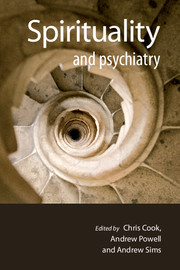Book contents
- Frontmatter
- Contents
- List of contributors
- List of tables, boxes and figures
- Foreword
- Preface
- The Spirituality and Psychiatry Special Interest Group of the Royal College of Psychiatrists
- 1 Spirituality in psychiatry
- 2 Assessing spiritual needs
- 3 Psychosis
- 4 Suicide
- 5 Child and adolescent psychiatry
- 6 Psychotherapy
- 7 Intellectual disability
- 8 Substance misuse
- 9 Neuroscience of the spirit
- 10 Spiritual care in the NHS
- 11 The transpersonal perspective
- 12 Religion and religious experiences
- 13 Pathological spirituality
- 14 Ageing
- Index
Preface
Published online by Cambridge University Press: 02 January 2018
- Frontmatter
- Contents
- List of contributors
- List of tables, boxes and figures
- Foreword
- Preface
- The Spirituality and Psychiatry Special Interest Group of the Royal College of Psychiatrists
- 1 Spirituality in psychiatry
- 2 Assessing spiritual needs
- 3 Psychosis
- 4 Suicide
- 5 Child and adolescent psychiatry
- 6 Psychotherapy
- 7 Intellectual disability
- 8 Substance misuse
- 9 Neuroscience of the spirit
- 10 Spiritual care in the NHS
- 11 The transpersonal perspective
- 12 Religion and religious experiences
- 13 Pathological spirituality
- 14 Ageing
- Index
Summary
What kind of book is this and what is it about? Spirituality is not easily defined. Although many perceive it as very important, its controversial nature has led to it being defined in diverse ways. The definition that we have taken, with a view to inclusiveness, is concerned with human experience of relationship, meaning and purpose. This includes a transcendent, or transpersonal, dimension of experience that has traditionally been regarded as being more the domain of religion and theology than psychiatry. But it also encompasses experiences that are very familiar to psychiatry – life within family and society that have usually been viewed in a secular and non-spiritual sense. Such experiences have generally been taken as reflecting personal or interpersonal dynamics, emotions, cognitions and beliefs, which obey the ‘laws’ of sciences such as psychology, sociology and neurobiology. Immediately, then, this book raises the question of why anything more than science should be necessary. Cannot ‘spirituality’, whatever it is, be reduced to scientific discourse, a matter of objective consideration without any transcendent or transpersonal dimension?
As will become apparent, the contributors to this book have various implicit or explicit responses to this question. First, that there is a growing body of research supporting the importance of spirituality as an independent and dependent variable of some significance, arguably not reducible to a purely bio-psychosocial level. For some issues approached in this book, such as those on substance misuse, neuroscience and old age psychiatry, the body of research of this kind is already quite considerable. For others, however, such as child psychiatry, learning disability psychiatry and the transpersonal perspective, research is still in its infancy.
Second, there are the voices of service users who assert that spirituality is a dimension of their experience that they wish to be able to discuss without it being labelled in pathological terms. The book contains many examples of this kind drawn from clinical practice. In chapter 3, for instance, we find the story of Julie (case study 3.5), whose therapist apparently failed to understand that thoughts as well as actions can be understood as culpable. Such a notion is familiar to philosophers, theologians and priests, but is easily misunderstood phenomenologically by psychiatrists as magical thinking or delusion.
- Type
- Chapter
- Information
- Spirituality and Psychiatry , pp. xii - xivPublisher: Royal College of PsychiatristsPrint publication year: 2009



